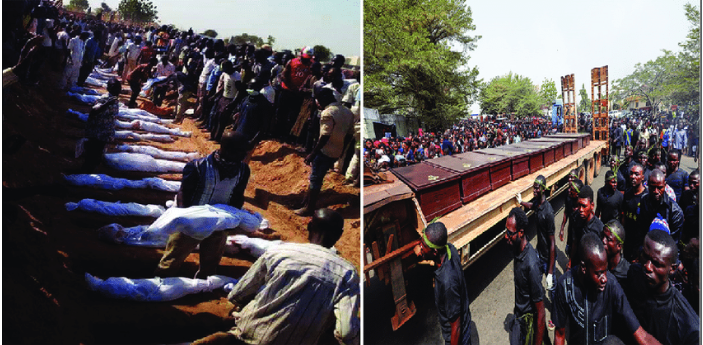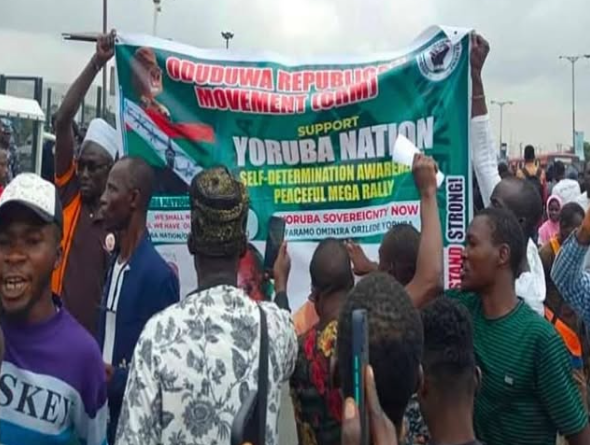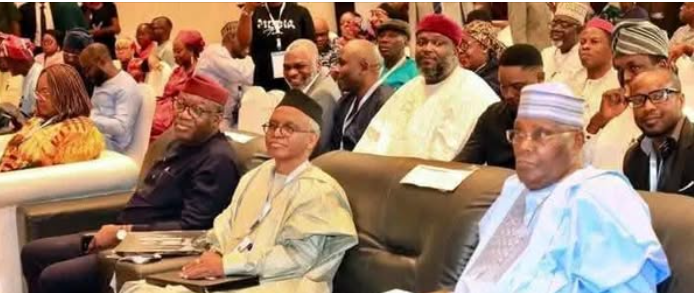[Idowu Faleye-+2348132100608, ephraimhill01@gmail.com]
For almost ten years, Nigeria suffered under Muhammadu Buhari’s leadership—a Fulani-led presidency that divided the nation, worsened insecurity, displaced farmers from their farmland and left millions displaced from their homes. Now, as another election draws near, one crucial question must be asked: Can Nigeria survive another Fulani-led government? The risks are too profound to ignore.
Nigeria has never been in greater danger. The past serves as a harsh reminder. Buhari’s presidency was a disaster—his leadership plunged the country into chaos, turning large parts of Nigeria into war zones. Between 2015 and 2023, over 60,000 Nigerians were killed by insurgents, while more than three million were forced from their homes. The herdsmen crisis spiralled into a national catastrophe.

Instead of protecting all Nigerians, Buhari openly favoured Fulani interests, deepening ethnic hatred and fueling resentment. Under his watch, Fulani herdsmen—backed by Miyetti Allah—unleashed terror on farmers, Southerners, and Middle Belt communities. They killed, maimed, destroyed, and displaced thousands, yet Buhari did nothing. Instead, he filled key military and police positions with Fulani officers, shielding the killers from justice. Even when some were arrested, they received soft treatment, reinforcing a system where Fulani militants could act with impunity.
For six years, herdsmen ravaged farms, leaving death and destruction in their wake. Yet, within a year of a non-Fulani president taking office, these attacks have mysteriously declined. This raises urgent questions: Was the crisis deliberately orchestrated to serve Fulani interests? Why did the violence drastically ease with a change in leadership? How do we ensure it never happens again? Another Fulani-led government would only reignite these crises. Nigeria cannot afford another presidency built on ethnic bias and destruction.
Read Also: Buhari’s Untouchable Past: The Lingering Legacy of Resources Mismanagement in Nigeria
The Fulani political elites—Atiku Abubakar, Rabiu Kwankwaso, and Nasir El-Rufai—are desperate to restore Fulani dominance. Their goal is not national progress but a return to power, using Nigeria’s resources for their gain. After decades of controlling the country’s wealth, security forces, and policies, the Fulani hegemony now fears losing its grip. Their latest strategy is Political manoeuvring and religious manipulation to push Sharia law deeper into the South.
The attempt to introduce Sharia law in Yoruba land is a calculated plot to exploit religion for political control. By falsely claiming that Southern Muslims are marginalized, Fulani hegemony has created a pretext to spread Sharia, especially in Yoruba states like Ekiti and Oyo. With bribes and influence, they have begun quietly enforcing Islamic laws in some areas, all under the illusion of religious inclusivity.

This is not about faith—it is about power. The goal is to manipulate the Yoruba people into supporting Fulani rule through religious influence. If they succeed, Nigeria could fall back into the hands of a Fulani hegemony, driven not by development, but by desperation for control. For the Fulani elite, power is not just politics—it is survival. The question is: Will Nigerians allow history to repeat itself?
Historically, Fulani feudalism has always been about dominance and control. Since Hugh Clapperton’s expedition to Northern Nigeria in 1824, Hugh’s records have shown how Fulani oligarchs built their empire through exploitation. Today, nothing has changed. Using political trickery, religious brainwashing, and economic suppression, the Fulani hegemony has maintained its rule over other ethnic groups in Nigeria, particularly over the Hausa people.
Read Also: The Hard Way is the Only Way for Sustainable Economic Recovery in Nigeria
Once proud custodians of their land, the Hausa have been reduced to subjects under Fulani feudalism. Their heritage and identity have been hijacked. But now, resistance is building. The Hausa are awakening, uniting beyond religion to reject Fulani leadership once and for all. Sensing this, the Fulani oligarchs have ramped up their push for Sharia law—a tool historically used to keep indigenous populations in check. Their efforts to spread Sharia into Yoruba land expose their ultimate goal of maintaining their hold over other ethnic groups via religious brainwashing.
For decades, Southern Muslims, Northern Christians, Middle-Belt communities, and some Yoruba monarchs have unknowingly enabled the Fulani agenda. Political figures like Dr Kayode Fayemi, Senator Biodun Olujimi, Rotimi Amaechi, Liyel Imoke, Emeka Ihedioha, and even Peter Obi are now being unknowingly recruited onto this web. Such an outdated strategy must be firmly resisted across the South. Nigeria cannot afford to fall for the same trap that has destabilized the country since independence
Read also: Clamour For Military Intervention: A Retrograde Amnesia of Nigeria’s Painful History with Dictatorship
History has shown that societies that have been under Fulani dominance in the past have eventually revolted. In Ghana, Mahamudu Bawumia’s presidential bid failed largely because of his wife’s Fulani heritage. Similarly, native uprisings overthrew the Fulani-linked Abbasid and Umayyad dynasties in Spain. Across West Africa—Burkina Faso, Mali, Niger—Fulani-led insurgencies have triggered national resistance movements. The pattern is clear: Fulani dominance breeds instability.
Those pushing for another Fulani presidency are the same Fulani oligarchs behind Nigeria’s banditry and Boko Haram crisis. To secure Buhari’s victory in 2014, they allowed armed militias from the Sahel to infiltrate Nigeria, fueling the insecurity that still plagues the country today. Their actions have drained the nation’s economy, cost the nation trillions in military spending, and led to the deaths of countless civilians and soldiers. Now, they are at it again, plotting another political takeover that will endanger Nigeria’s future.

The warning signs are clear. Nigerians must choose: Will we allow another Fulani-led government to plunge the country into deeper chaos, or will we finally break free from a cycle of manipulation and destruction? Buhari’s years in government inflicted wounds so deep that Nigeria is still struggling to heal. The mere thought of another Fulani presidency should send shivers down the spine of every patriotic Nigerian.
Have we already forgotten the carnage, the economic collapse, the unchecked massacres, and the blood-soaked roads? Have we forgotten the thousands butchered in their sleep, the farmers driven from their lands, and the communities reduced to ashes? The progress made in security did not come easily—it was paid for with the sacrifice of trillions in military expenditures and countless lives of our fallen soldiers. To gamble it all away by allowing another Fulani regime is to invite chaos back through the front door, to spit on the graves of those who perished fighting for a safer Nigeria.
Read also: The Northern Political Agenda and the Antics of El-Rufai’s Political Game
The choice before Nigerians is one of survival. Will we stand together and defend the hard-won gains, or will we allow history to repeat itself, dragging us back into the abyss? Another Fulani presidency is not just a political transition; it is a summersault for national unity, security, and economic stability. Those scheming to return the country to Fulani domination do not care about the people—they care only about power, control, and the preservation of their feudal empire. But Nigerians must decide: Will they rise, resist, and reclaim their country, or will they surrender once again to the forces that have kept them in bondage? The future is in our hands.
Idowu Faleye is a Policy Analyst with a background in Public Administration and the Publisher of EphraimHill DataBlog. He leverages data-driven insights and evidence-based analysis to provide informed perspectives on critical issues of public interest. He can be reached via WhatsApp at +2348132100608 or email at ephraimhill01@gmail.com
© 2024 EphraimHill DC. All rights reserved..










































![The Trend of Insecurity in Nigeria. [Part 2]](https://ephraimhilldc.com/wp-content/uploads/2024/09/Computer-Monitoring-of-Remote-areas.png)



































